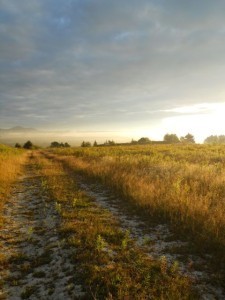Rivera Sun's Blog: From the Desk of Rivera Sun, page 35
December 10, 2013
TPP Tuesday Tweets!
43 Tweets to use for TPP Tuesday Twitter Storm. Feel free to pass these on and modify the hashtags, too. All the quotes are from Rivera Sun’s novel, The Dandelion Insurrection, a story of love and revolution resisting corporate tyranny in America. Thank you for helping to stop the TPP!
PLS RT Great Motivational Tweets to #StopTPP #TPP #TPPTuesday #Occupy PLS Favorite RT & Share http://www.risingsundancetheater.com/...
One man’s treasure is another man’s hunger. The #TPP is not our treasure, it’s our hunger. #OWS #Occupy @RiveraSunAuthor
#StopTPP or We stand as much chance of surviving as a peanut in an elephant farm! @RiveraSunAuthor #Occupy
There is a parasitic connection between the rich and poor … and the fattest ticks are the ones at the top. #StopTPP ~ @RiveraSunAuthor
Money is the only vote that matters . . . and we haven’t got it! #StopTPP #TPPTuesday #TPP @RiveraSunAuthor
The reason they are so rich is because everyone else is so poor. #StopTPP #TPPTuesday #TPP @RiveraSunAuthor
Congress plays to the profit-piper’s tune and passes rich men’s legislation while the unemployment lines grow. #StopTPPFastTrack
The soup kitchens scrape the bottom of the pots long before the hunger of the people stops #StopTPP ~ @RiveraSunAuthor
The hunger of the poor grows as fast as the pocketbooks of the wealthy. #StopTPP ~ @RiveraSunAuthor
A great service to God would be to tax the rich to feed the poor. #StopTPP ~ @RiveraSunAuthor #Occupy
If you want to do something truly radical–Be kind. Be connected. Be unafraid. And #StopTPP @RiveraSunAuthor #Occupy
Trickle-down, corporate tax breaks, austerity measures, work harder and you’ll get ahead; these are all lies. So is #TPP @RiveraSunAuthor
The rising tide of greed is breaking the floodgates of morality. #StopTPP @RiveraSunAuthor
Great clouds of misinformation obscure the constellations of truth. Not needed with #TPP-it’s Secret. @RiveraSunAuthor
Congress is playing to the profit-piper’s tune & passing rich men’s legislation. #StopTPP #Occupy @RiveraSunAuthor
The rich don’t care about the masses of people in poverty. They don’t even know they exist. #StopTPP #Occupy @RiveraSunAuthor
The rich get richer, and the poor get poorer. That’s how it goes in America. #StopTPP ~ @RiveraSunAuthor
Too much money is made from the suffering of the poor! #StopTPP ~ @RiveraSunAuthor
The days of profiting from the poor are numbered. The wealthy are sucking us dry, like they do everything else. #StopTPP @RiveraSunAuthor #Occupy
Corporate influence on politics effectively disenfranchises all but the extremely wealthy. #StopTPP ~ @RiveraSunAuthor #Climate
Only millionaires can run for Congress; the rest of us are taxed without any hope of representation. They are passing #TPP #StopTPP @RiveraSunAuthor
We’ve got to tackle greed. If we don’t address it, no amount of revolution will bring lasting change. #StopTPP #Climate @RiveraSunAuthor
Democracy is not dead; it has just been twisted beyond recognition. #TPP will kill it. #StopTPP ~ @RiveraSunAuthor #Climate
Greed is a disease that will kill us all. #StopTPP ~ @RiveraSunAuthor #Occupy #Climate
The wealthy vilify the lower class as suckers on the system while the rich suck the entire nation to death. #StopTPP ~ @RiveraSunAuthor
We have our bodies and our hearts and nothing else, but all across the world, that is what has pushed for change. #StopTPP @RiveraSunAuthor
Be like the dandelion, stand up among the grasses, thrive in adversity, shine with revolution. And #StopTPP ~The #Dandelion Insurrection
Government by the people, for the people won’t just fall from the sky. We have to reach for it and pull it into reality. #StopTPP #Occupy
This time will either be the beginning of a new world … or our last days on earth. #StopTPP ~ @RiveraSunAuthor #Climate #StopKXL
The reason they are so rich is because everyone else is so poor. #StopTPP #TPPTuesday #TPP ~ @RiveraSunAuthor
How long will you live and die by thousands without rising up for change? #StopTPP #Climate @RiveraSunAuthor #Occupy
Just between you, me, and the government’s spies. . . #StopTPP ~ @RiveraSunAuthor #StopKXL #Climate
The US has “no functional democracy at this moment”~ President Carter. Time to change that. #StopTPP #NoTPP ~ @RiveraSunAuthor
The United States is no longer a functional democracy . . . unless the people rise up to restore it! #StopTPP ~ @RiveraSunAuthor
If we don’t do something now, our kids won’t even remember the freedoms or rights that our forefathers fought for. #StopTPP ~ @RiveraSunAuthor
We can’t run away from what’s happening in this country. We’ve got to meet it, head on. #StopTPP ~ @RiveraSunAuthor #Climate
Future food policy–”The authorities are anticipating riots,” #StopTPP ~ @RiveraSunAuthor #Climate
Police barricades,riots in the cities. Curfews,ghettos, hunger. Fear or love. We choose. #StopTPP ~ @RiveraSunAuthor
Take the outrage of the people and channel it towards change. There are 300 Million of us. #StopTPP~ @RiveraSunAuthor
Democratic rights are being eroded under the persistent chiseling of politicians’ #StopTPP ~ @RiveraSunAuthor #Occupy
Our corporate political leaders are waging destructive war upon humanity and the earth. #StopTPP ~ @RiveraSunAuthor #Climate
I swear, something is cookin’ behind the scenes and it sure ain’t fried chicken. #TPP is a secret deal. #StopTPP ~ @RiveraSunAuthor
We will not run. We will not hide. We will remain . . . and we will win! #StopTPP ~ @RiveraSunAuthor #StopKXL #Climate
Death’s shadow cannot darken the light of love. #StopTPP ~ @RiveraSunAuthor #Occupy #Climate
The most terrifying powers known to man are lined up to protect the few in their greedy desire to destroy everything #StopTPP @RiveraSunAuthor
Our respect for life and compassion for all creation require us to confront the forces of destruction. #StopTPP ~ @RiveraSunAuthor
This country is ready to be reborn. Something fresh and new is fomenting in the fertile crumbling of the old. #StopTPP @RiveraSunAuthor
When will the day come when you say, enough! #StopTPP #TPPTuesday ~ @RiveraSunAuthor #Climate
In a time of hate, love is a revolutionary act. #StopTPP ~ @RiveraSunAuthor #Occupy #Climate
A freedom given up is not so easily regained #StopTPP ~ @RiveraSunAuthor
I don’t want to get mixed up in trouble, but trouble’s at our door #StopTPP ~ @RiveraSunAuthor #Climate
The disease of lack of caring is eating at our hearts, don’t let it eat yours. #StopTPP ~ @RiveraSunAuthor
We don’t live in a democracy, we live in a kleptocracy #StopTPP before they steal EVERYTHING ~ @RiveraSunAuthor #TPP
December 8, 2013
The Pen in the Prison State
There are subjects that break my heart and pull my pen toward them like gravity. The prison system is one of them. As a social protest novelist, I took my first novel, Steam Drills, Treadmills, and Shooting Stars, into the human impact of high incarceration rates and the policy effects of the private prison industry’s lobbying. Acknowledging the depth of suffering in the issues I explore in my novels alters the landscape of my soul. Learning about mountaintop removal, drone strikes, poverty, and prisons changes me irrevocably. After researching both the facts and the human truths, a pit remains inside me, a bombed out village, a mother crying over her child’s body, and millions of faces behind bars, watching me with burning eyes.

Beau Hodai is an investigative journalist and the publisher at DBA Press.com 100 percent genuine raking, 100 percent genuine muck.
So, when Beau Hodai, investigative journalist and founder of DBA Press, began explaining some of the facts behind what is becoming known as “the prison-industrial complex”, he evoked in me the sea of faces that have no names – the millions of ordinary people whose lives are caught up in the net of injustice and corruption. As Beau speaks carefully about the connections between Arizona’s private prison industry, lobbyists, appointed judges, contracts, and policies, I am haunted by the human stories tangled in his information.
Investigative journalists and social protest novelists deliver a one-two punch to the story of our times. Beau delivers the facts; I deliver the intangible human truths. Together, we form a genre known as muckraking that operates within both journalism and fiction to bring public attention to issues of extreme injustice. When you fully grasp the sickening depravity of individuals profiting from the suffering of imprisoning millions of people, then Beau and I have both done our jobs. Each of us has our strengths. For instance, journalism will inform you that:
- There are 153 corrections facilities run by private corporations in the US.
- There are 1,571,013 prisoners in our state and federal prisons.
- Corrections Corporation of America made $1.7 billion in total revenue in 2011.
- Occupancy guarantee clauses in private prison contracts range between 80% and 100%, with 90% as the most frequent occupancy guarantee requirement. *
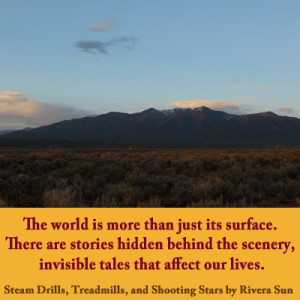
Rivera Sun is a social protest novelist who writes about the compelling issues of our times.
Meanwhile, a novel will bring to you the human stories, such as wrongful convictions ruining lives, twenty-hour bus rides to visit incarcerated family members intentionally sent to corrections facilities far away, the callousness of a system that spits out parolees who cannot get jobs and are branded for life by convictions, the social cost of imprisonment in terms of legal expenses, broken families, racial profiling and tensions, heartache and separation, and so on.
Beau has become an expert in strategies for filing public records and Freedom of Information Act requests to trace the intricate connections of policy, public funding, and corporate influence on politics around these issues. On the other side of the coin, I have become a repository for human experiences. My research took me, at one point, to support groups for wives of prisoners, where I discovered that my heroine’s experience of seeing her child’s father convicted just days before their son was born was not a wild imagining. It was – and still is – a devastatingly common occurrence.
Beau Hodai speaks with the precision of a lawyer. His writing is dense, in depth, and information-rich. In an era of sound bite journalism, Beau is an endangered species. There are only 400 Sumatran tigers left in the world . . . but I wonder if we even have that many investigative journalists left in the United States. In depth reporting plays an essential role in the ecosystem of truth, information, public awareness, and accountability. It would be a tragedy if they go the route of the Black Rhino, the dodo, or the passenger pigeon. The proliferation of superficial, shock-oriented corporate media tactics has already delivered serious blows to public understanding of issues.
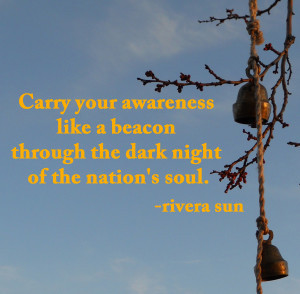
“There are stories that break my heart and pull my pen toward them like gravity.” – Rivera Sun
Social protest novels, on the other hand, have an exciting opportunity before them. As we writhe in the midst of a second, more extreme Gilded Era, we are called to action like writers who came before us. The term, the Gilded Era, was coined by Mark Twain to describe the thin facade of gold that covered sordid squalor beneath it. Great American writers such as Upton Sinclair and John Steinbeck arose in this time, penning novels that shaped legislature and the direction of the nation. They bent their pens to the pressing issues of their days, leaving us a literary legacy that modern writers would be wise to emulate. Today, we have the tools of computers, online direct marketing to readers, electronic novels, independent publishing, on-demand printing, and crowd-funding – all of which give us unprecedented freedom of expression.
If we, as writers, do not apply our craft to addressing the dire problems our society faces, then we are eschewing our responsibility to all of humanity. No writer should remain silent, innocuous, or irrelevant at these times. The old adage of the pen is mightier than the sword is only true if we wield it with the ferocity and skill of the warrior. As our fellow journalists face severe restrictions and challenges, social protest novelists must come to their aid, using our ability to capture hearts and minds, and rallying people to strive for social change.
Author/Actress Rivera Sun sings the anthem of our times and rallies us to meet adversity with gusto. In addition to her most recent novel, The Dandelion Insurrection, she is the author of nine plays, a book of poetry, and her debut novel, Steam Drills, Treadmills, and Shooting Stars, which explores the prison system, mountaintop removal, and climate change.
Tune into Occupy Radio as co-hosts David Geitgey Sierralupe and Rivera Sun interview Beau Hodai on filing Freedom of Information Act requests, the private prison industry, and the impact of the surveillance state on journalism and activism. Listen Live on Wed, Dec 11th (7pm PST/10pm EST) here and join the live chat on the Occupy The Media Facebook page during the show. Can’t make that time? The podcast comes out on Sat Dec 14th on occupythemedia.podomatic.com.
For more on Beau Hodai’s work visit: http://www.dbapress.com where, among many other articles, you will find these two on the private prison industry and the influence of ALEC on public policy:
“A Case Study on CCA’s Web of Influence in Arizona: Mark Brnovich:”
http://www.prwatch.org/news/2013/09/12251/case-study-cca%E2s-web-influence-arizona-mark-brnovich
“Brownskins and Greenbacks: ALEC, the for-profit prison industry and Arizona’s SB 1070:” http://dbapress.com/front-page/brownskins-and-greenbacks-alec-the-for-profit-prison-industry-and-arizonas-sb-1070
* These statistics come from:
Bureau of Justice Statistics, “Correctional Populations In The United States, 2011″
http://www.bjs.gov/index.cfm?ty=pbdetail&iid=4537
Alternet.org “6 Shocking Revelations About How Private Prisons Make Their Money”
http://www.alternet.org/civil-liberties/6-shocking-revelations-about-how-private-prisons-make-their-money
December 1, 2013
Occupy the Apocalypse
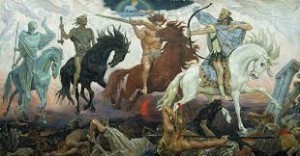
What if the Apocalypse isn’t what you think?
“This country is ready to be reborn. Something fresh and new is fomenting in the fertile crumbling of the old.” – The Dandelion Insurrection
Two years after the rise and demise of Occupy, we are still spinning around wondering what happened . . . and what comes next. The discussion runs in tail-chasing circles so often that when my radio show co-host suggested that we interview Nathan Schneider, an editor for Waging Nonviolence.org and the author of Thank You Anarchy, Notes From the Occupy Apocalypse, on the subject, I rolled my eyes in exasperation. Why beat the old Occupy horse?
But after five minutes of conversation with Nathan, my mind began racing down new avenues of thought. Maybe Occupy isn’t just any old horse. What if Occupy was a phenomenon of mythic proportions? What if the Occupiers were the un-prophesized horsemen of the Apocalypse . . . and the “Apocalypse” is not what we think?
“An apocalypse”, translated literally from its Greek origins, is a disclosure of knowledge, a lifting of the veil, or a revelation. In his book, Nathan dives into the epistemology of the word and offers some revelations on what was happening beneath the surface of the Occupy movement. Nathan managed to jump on board the Occupy Wall Street ship before it launched into Zuccotti Park. This vantage point gave him a few observations that many of us, in our satellite occupations throughout the country, may not have seen.
According to Nathan, there were a lot of artists at the helm of the early stages of the Occupy Wall Street planning process, and what emerged was designed as a massive performance, a public demonstration of democracy in action. In the aftermath of the police crackdown on the encampments, the corporatized mainstream media declared the movement a failure. Yet, Nathan, in his simple and quiet manner, debunks that whole idea. Occupy achieved exactly what it was designed to accomplish: it brought participatory democracy to public awareness, provided a soapbox for the roiling discontent felt by Americans, broke the silence around wealth disparity, spread multi-nodal occupations virally throughout the nation, and reclaimed public spaces for the use of the people.
Back in 2011, when the exploding movement swept through my small, coastal California town, I felt that I had stumbled onto a huge ritual without a shred of cultural context or training for participation. It was outrageous, wildly exciting, and deeply mystifying. What were we hoping to accomplish? How were our scraggly rows of tents going to collapse corporate empire? This consensus thingy was cool, but how could we possibly hope to wage a struggle against the most effective corporate machine on the planet with this unwieldy technique?
With his notion of the Apocalypse, Nathan reframes such questions into an entirely different understanding. Occupy was not a coordinated struggle to collapse corporate domination . . . Occupy was a massive performance staged to tear down the veils of delusion that obscured the average American from recognizing the depth of the socio-economic-political problems that we face.
A great ritual took place in Fall 2011, conducted by the unlikely secular shamans of anarchists and activists. They effectively enlisted the public’s imagination and channeled pent-up frustration into the metaphysical task of tearing apart our notions of reality. They picked up the tools of alternative media, participatory democracy, slogans, and chants to help them. They held symbolic parades and demonstrations to bring people to catharsis. They shared food and organized encampments for this great ritual to take place in.
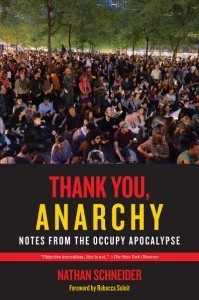
Thank You Anarchy: notes from the Occupy Apocalypse by Nathan Schneider
Those of us who Occupied may laugh at this notion, remembering six hour General Assemblies stuck on the nitty-gritty subjects such as drum circles and Porta Potties. Yet, on a more mythic level, it appears that this untried collection of secular citizens, accomplished a task equal to the greatest saints and sages of all traditions: the stripping away of collective delusion.
Occupy triggered an apocalyptic breakthrough around wealth and class – and not just in the United States. Around the world, from one country to the next, a wave of Occupy movements erupted. One could call these popular uprisings . . . but you could also call this the largest, secular, international ritual in the course of human history. The purpose of the ritual was the deconstruction and reconstruction of our understanding of reality.
Using popular dissent, Occupy allowed the people to reshape our collective understanding of the causes of poverty, our flailing economy, unemployment, and mortgage failures. Prior to Occupy, the general delusion (which is still propagated by the politicians and corporate media) placed the blame of these things solely on the individual, insinuating that poverty was a sign of laziness, ineptitude, and personal failing . . . not an outcome of systemic corruption and greed. Today, with nearly fifty percent of the U.S. population living at, or below, international standards of poverty, Occupy’s reframing helps us avoid the disempowering myth of personal failure and instead act with knowledge of the effects of the manipulations of corporate-politics and the greedy 1%.
Our work, however, is far from over. As the Christian Right coopts the phrase “Apocalypse” for their own purposes and uses the Biblical End Times as an excuse for self-righteous passivity in the face of concerted corporate-political destruction of the planet and people, it is time for citizens of conscience to “Occupy the Apocalypse”. We must bring to light the deeper meanings of the word. We have had one great ritual of tearing apart the veil of delusion (and many more are sure to come), but we cannot stop now, daunted by the horrors we have revealed. With determination, we must tear through every layer of delusion and corruption: the maggoty infestation of greed, the pestilence of corporate political influence, the famine of poverty, the frightening militarization of our police, the erosion of civil liberties, the rotten corruption of the prison-industrial complex, the decay of justice, the poisoning of the food supply, the global infestation of our military through the borderless war on terror, the enslavement of students to debt, and the wanton destruction of our environment, to name only a few.
“History is won by the most convincing story.” – The Dandelion Insurrection
. . . and the future is created this way, as well. Word by word, act by act, we must tell the revelations of what lies beyond the veil. Tearing down the old is one aspect of revolutionary change; building up the new is another. The two sides of this coin are in our hands. We must be bold enough to use them both. Beyond the sickening layers of our crumbling civilization is a whole new world just waiting to be born. Again and again, we must break through every layer of delusion. We must not flinch at the pestilence. We must not recoil at the horrors. We must keep going forward and reaching for the revelations on the other side.
Occupy was only the first of the many great secular rituals yet to come. In these times, every person must pick up the mantle of the heroic figures of all ages. We must dare to be visionary and dare to be prophets. We must be bold enough to speak truth and courageous enough to believe in the world that lies just beyond the horizon of now. If we do not, those who Occupy the Apocalypse with stories of utter destruction will find their prophecies coming true. Our right and responsibility is to Occupy the Apocalypse with a more compelling story of a sane, sustainable, and beneficial relationship between all human beings and the planet.
Tune into Occupy Radio as co-hosts David Geitgey Sierralupe and Rivera Sun interview Nathan Schneider on the Occupy movement, the Apocalypse, and the ongoing lifting of the veil. Listen Live on Wed, Dec 4th (7pm PST/10pm EST) here and join the live chat on the Occupy The Media Facebook page during the show. Can’t make that time? The podcast comes out on Sat Dec 7th on occupythemedia.podomatic.com.
Nathan Schneider is an Editor for Waging Nonviolence.org and the author of Thank You Anarchy: notes from the Occupy Apocalypse. His blog, The Row Boat, is full of interesting articles both by and about Nathan and his work.
Author/Actress Rivera Sun sings the anthem of our times and rallies us to meet adversity with gusto. In addition to her most recent novel, The Dandelion Insurrection, she is the author of nine plays, a book of poetry, and her debut novel, Steam Drills, Treadmills, and Shooting Stars, which celebrates everyday heroes who meet the challenges of climate change with compassion, spirit, and strength. http://www.risingsundancetheater.com/wpblog/
November 25, 2013
“Food Politics At the Family Table”
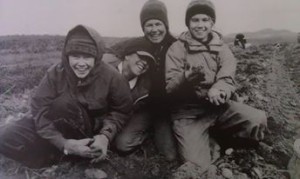
From left to right: Marada Cook, Leah Cook, Kate Cook, and yours truly, Rivera Sun photo by Madeleine de Sinety
In other years, Thanksgiving has found me ranting about Black Friday’s commercialization of greed during a holiday of gratitude. I have written historical exposes of the historical Thanksgiving and the genocide of the native tribes. I have explored the inner convolutions of emotions that come along with being an American. This year, I chose to leave those angles in the skillful hands of other writers, and offer my family story.
My sisters, Marada and Leah Cook run Crown of Maine Organic Cooperative, a twenty-year old family business that distributes Maine-made product and produce throughout the state. Thanksgiving, to them, is a celebration of the diversity and bounty of Maine’s local small growers and producers. The feast laid out on the table could serve as a roadmap of the state: potatoes from up north in The County (as Aroostook County, the largest and least populated area in the state is called), turkey from Flying Pond Farm down south, seaweed sprinkled on the rolls (hardly a traditional dish, but if your sister-in-law is a sea vegetable advisor for the Maine Cooperative Extension, you roll with it), and often the canned, stored, or frozen vegetable harvested from the summer garden right at home. And, lest we paint an overly idyllic picture, it should be noted that the homemade apple cider pressed from the orchard’s fruit will sit side-by-side with Moxie, an iconic Maine soft drink currently owned by Coca-Cola. Politics is separable from food and, inevitably, every angle of food politics from the Poland Springs water contract to tar sands pipelines, labor movements both current and historical, potato blights, fuel prices, Farm Bills, tourist dollars, dwindling fisheries, and booming eels exports to China, ends up on the table along with the mouth-watering dishes.
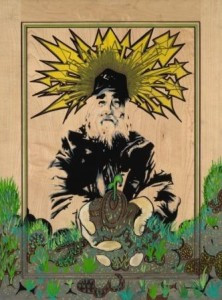
A portrait of my father, Jim Cook, an advocate for local agriculture in Maine, by artist Luke Fuller.
Back when I was a teenager, working on our family farm, the State of Maine came out with the slogan, Get Real, Get Maine. At the time, we laughed at the bureaucratic advertising scheme and swatted the hordes of mosquitos away as we hefted 60lb boxes of potatoes. We dismissed the slogan as a tourist trap that would seduce people from ‘Away’ (as we called any place outside of the state) to picturesque seaside coves that lay three hundred miles to the south of us. The real Maine we lived in – shoveling chicken manure, chasing seven-hundred pound pigs that broke loose, swatting the black flies with one hand while squishing the potato beetles with another – was hardly advertisement material.
Or so we thought.
By the time I left for college, my siblings and I had become, quite literally, poster children for a growing Maine food revival. Our family story is part of a collection of stories about small farmers and local producers who did get real . . . we got real about the problems of industrial agriculture, climate change, the domination of the economy by mega-corporations, destructive forms of capitalism, the fragile long-distance transportation system, and, most importantly, our values. Mainers got real and got Maine engaged in the long haul of rebuilding the local food economy. Mainers have always prized self-sufficiency and independence. Those qualities, in combination with a firm belief in supporting your neighbors, grew a network of growers, producers, restaurants, grocery stores, and buying clubs to support local agriculture. It is also worth noting that the local food movement involves people from all ends of the class spectrum. In Maine, local food isn’t just for wealthy, natural food store shoppers; it is the heritage of an area long used to fending for itself. In many ways, local food is the cultivation of a relationship to people and place.
The fields of Northern Maine, looking toward Canada
It is not easy to propose and actualize alternatives to the corporatized food system of the United States. The small organic farmer versus Big Agribusiness is a true David and Goliath story of our times. As I study nonviolent struggles around the world, similar instances of the Underdog versus the Empire provide useful perspectives on the challenges we face in our own communities.In the struggle for Indian Independence, Gandhi formulated a strategy called “Constructive Programme” or “Swadeshi”, which built pride and economic independence from British imports through projects that provided for the basic needs of the people. In India, this involved eighteen distinct enterprises, the most well known of these are the weaving of cloth and the making of salt. Gandhi used Constructive Programme to both empower the Indian movement for self-rule and to undermine British control. In a five-year period, the British trade with India fell nearly fifty percent!
The local food movement in Maine is not a coordinated nonviolent struggle for revolution, but it is quietly and humbly accomplishing many of the same aims. A source of strength, independence, and pride can be found in everything from seaweed to sheep’s wool, little-known delights like maple cream and blueberry butter, and also in staples, such as potatoes, wheat flour, and, yes, salt!
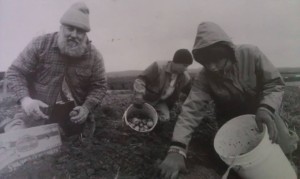
My father, Jim, picking potatoes on the farm with my brothers, Skylar and Land. Photo by Madeline de Sinety
It has never been an exaggeration to say that Maine has a distinct ‘flavor’ . . . but in recent years the phrase has shifted from metaphorical to literal. I have seen the local food movement contribute to a rising sense of pride in Mainers, in themselves, their region, and their accomplishment in the face of tremendous odds. In a time when corporate-control of politics is wreaking havoc on our environment, economy, and society, the progress of the Maine local food movement should be applauded.
Thanksgiving is always a time of deep reflection for me. As I give thanks for the bounty of this moment, I am also forced to confront the challenging questions posed by history and identity. My family’s story is entwined in this as deeply as the next, but I take stock in the idea that change is always enacted in the present. Hopefully, the story of local food and family is a part of writing a more humane chapter in the course of American history.
Tune into Occupy Radio for a Thanksgiving Special as co-hosts David Geitgey Sierralupe and Rivera Sun interview her sisters, Marada and Leah Cook on food politics and family history. Listen Live on Wed, Nov 27th (7pm PST/10pm EST) here and join the live chat on the Occupy The Media Facebook page during the show. Can’t make that time? The podcast comes out on Sat Nov 30th on occupythemedia.podomatic.com.
Read the Crown of Maine Blog for mouth-watering and mind-stimulating thoughts on local food in Maine and find out more about them at www.crownofmainecoop.com
Author/Actress Rivera Sun sings the anthem of our times and rallies us to meet adversity with gusto. In addition to her most recent novel, The Dandelion Insurrection, she is the author of nine plays, a book of poetry, and her debut novel, Steam Drills, Treadmills, and Shooting Stars, which celebrates everyday heroes who meet the challenges of climate change with compassion, spirit, and strength.
November 18, 2013
“Meet Me at the Bill of Rights: America’s Common Ground”

Could The Bill of Rights be the common ground where the diverse American people can meet?
Note: Usually this blog post features a companion article to our weekly Occupy Radio interview. This week, however, Radley Balko, senior writer and investigative reporter for the Huffington Post, hit upon a concept so powerful that, with all due respect, I had to detour from discussing his bestselling book about the militarization of our police state, The Rise of the Warrior Cop. In preparation for the radio interview, I read some of the ninety-three, five-star reviews of Radley’s book on Amazon.com. The readers crossed the political spectrum, which led me to ask Radley if opposition to the rising police state was a bipartisan American issue. He confirmed this notion, but clarified: it is a common issue for ordinary citizens, but not for political leaders. The Democrats and Republicans only object to excessive police power when they are not in control of it. Citizens, however, feel the chilling effects, regardless. When Radley explained that the rise of the police state occurs through the erosion of civil liberties, a powerful notion swept through me. What if Americans aren’t as divided as they seem? What if the Bill of Rights was the rallying point for us all?
United we stand, divided we fall. The old adage appears to be the maxim of the elite: keep the populace divided and they will do the dirty work of subduing themselves. Keep the people fragmented and they will never be able to overthrow the elite. Keep the masses fighting over crumbs tossed from ivory towers and they will never seize the treasure troves that the wealthy horde.
Throughout all of history, this is how the masses are controlled by the few.
United we stand, divided we fall. Political leaders haul the old phrase out of storage to rally us to their causes, support their wars, and frighten us into obedience. They quickly stuff it out of sight, however, when people start to organize together. For beneath its common understanding as a warning, it also contains the formula for revolution.
United we stand . . . many of us find it laughable to contemplate unity among the seemingly deeply polarized American people. Every conceivable bone of contention is tossed at us by the media. We are told that even the smallest political issue leads to shouting matches. Families don’t dare discuss politics at the dinner table. The pundits tell us that Americans could never come together . . . liberals and conservatives are oil and water. They don’t mix.
And so, divided we fall, exactly as the powerful intended. As their abuses grow more blatant, they beat the old pony of division, pull out the fanfare of distraction, and force our eyes away as they intrude on sacred territory. They are desperate to keep us from noticing their desecration of the one thing Americans agree on . . .
The Bill of Rights.
This is our common ground. The Bill of Rights is the place where conservatives, liberals, radicals, and revolutionaries meet. We may disagree on every subject under the sun – economics, military, taxes, social programs, religious rights, science, public education – but over and over again, we agree on one thing: we have the right to disagree.
We may be shortsighted on the equal application of our rights, but most Americans believe that at least they, themselves, should enjoy the freedom of religion, freedom of speech, a free press, and free assembly; the right to keep and bear arms; freedom from unreasonable search and seizure, security in personal effects, and freedom from warrants issued without probable cause; indictment by a grand jury for any capital or “infamous crime”; guarantee of a speedy, public trial with an impartial jury; and prohibition of double jeopardy. The Bill of Rights protects the rights of citizens from the tyranny of the empowered. Through the hard-waged struggles in the course of our history, we have expanded those protections from the narrow category of white, propertied males to include all men and women of every race. Over the years, the scope of the Bill of Rights has continuously widened . . . until now.
Today, the U.S. Congress is controlled by powerful, multi-national corporate interests that profit from a destructive, industrial growth society that is becoming increasingly unstable as global economies collapse, and climate change demands the massive overhaul of our fossil fuel dependent civilizations.
The last thing the corporate elite need right now is a popular uprising.
So, they pull out the old tricks: divide and conquer . . . and, while they’re at it, they may as well erode the Bill of Rights. In New York City, assemblies of more than twenty individuals must be permitted. In Boston, the manhunt for the Boston Bomber inspired citizens to willing give up their Fourth Amendment rights and allow police to search their homes without warrant. Private Manning – and countless other lesser-known citizens – waited years to see the fulfillment of the right to a “fair and speedy trial”. Any citizen suspected of association with terrorists, including investigative journalists, can be detained without warrant or access to lawyers under the National Defense Authorization Act. Police, violating our rights to speech, assembly, and petition, routinely repress demonstrations and protests. The list of grievances is too long to be fully examined here.
The erosion of the Bill of Rights by our political leaders is not an accident. Democracy is not their aim. Power in the hands of the populace is utterly at odds with their desire to maintain political-economic control.
Unfortunately for them, their desire for profit is also at odds with the continued survival of our species.
The timeline for overcoming tyranny is shortened by the impending ecological crisis. People are rapidly radicalizing as we confront blatant corruption and sociopathic greed. Many of us perceive that as the members of the wealthy elite become transnational citizens, the bulk of the American populace is being recolonized into a poor, oppressed underclass. Nearly fifty percent of the US population currently lives at or below international standards of poverty. The corporate-political model is not concerned with the health and well being of the American people. Congress’ approval ratings have reached record lows and politicians are scrambling to consolidate power into the hands of wealthy, corporate elite.
Civil liberties are under attack as the nation’s elite shore up their positions. They are not fools. They understand that the rights outlined in the Constitution are inimical to their continued domination. The Freedoms of Speech and Assembly foster dissension and ultimately lead to radical policy changes and shifts in power. Protection from unwarranted search and seizure reins in the powers of the rising police state. Justice, in any form, is an obstacle for authoritarian, tyrannical control. The civil liberties of the American people, as outlined in the Bill of Rights, represent a tremendous hurdle to the transnational corporate interests. They cannot destroy them without rousing opposition, but they also cannot ensure absolute domination with the Bill of Rights in place. So, they are cunningly and slowly eroding our rights, hoping we will not notice or object, or rise up in defense of democracy.
United we stand, divided we fall. Fortunately for the people, the Bill of Rights provides a rallying point for the diverse factions of our country.
The politicians have done their best to conceal this meeting place of all Americans. They use the media apparatus to keep us locked in the illusion of our divisions. The elite fear the collective strength of citizens empowered through our constitutionally granted rights . . . and rightly so.
If the people waged nonviolent struggle in defense of civil liberties, popular support would be massive. The added assistance of social institutions would be unstoppable. The judicial branch, which has slowly yielded to the corruption of the legislative and executive branches, would be forced to reconsider its stance. A nonviolent struggle by citizens waged in defense of our Constitution would split the loyalties of the military and the police down the middle. It would redefine American politics and, if strategized correctly, could break the corrupt two-party system, remove corporate personhood, and shift political power firmly into the hands of the people.
Common ground is powerful. United we stand, divided we fall.
Conservatives, liberals, radicals, and revolutionaries . . . meet me at the Bill of Rights. Defending civil liberties is not just the great unraveling of corporate tyranny: it is the resurrection of our democracy.
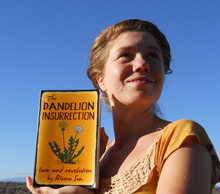
Rivera Sun, author of The Dandelion Insurrection
Tune in to Occupy Radio on Wed, Nov 20th, 7pm PST to listen to Radly Balko, senior writer and investigative reporter for the Huffington Post, dissect the rise of the American police state. (This radio show will be available after Nov 23rd as a podcast at OccupytheMedia.podomatic.com.)
Author/Actress Rivera Sun sings the anthem of our times and rallies us to meet adversity with gusto. In addition to her most recent novel, The Dandelion Insurrection, she is the author of nine plays, a book of poetry, and her debut novel, Steam Drills, Treadmills, and Shooting Stars, which celebrates everyday heroes who meet the challenges of climate change with compassion, spirit, and strength.
November 10, 2013
Rockers Not Frackers! Quebec’s Creative Resistance to Fracking

Philippe Duhamel, volunteer coordinator for Quebec’s One Generation Moratorium Campaign to ban fracking.
“Imagine!” Philippe Duhamel urges excitedly, “The natural gas industry is coming and instead of the usual blockade of activists, there could be a row of grannies in rocking chairs knitting!”
The whole scene whips through my mind lightning fast: the police come to arrest the protesters. The grannies lock down, not to natural gas drilling equipment, but to their rockers. The officers must then load them – rocking chairs and all – into the police van while the cameras flash and the banner behind them reads, “Rockers Not Frackers!”
“What if,” Philippe continues in his delightful French-Canadian accent, “we held a music concert on the service road to block the trucks?!”
Celine Dion explodes in my imagination.
“Near . . . far . . . wherever you are!” she howls in her best Queen of Canadian Divadom style as the police attempt to haul away her ardent-fans-turned-activists.
Philippe Duhamel is a volunteer coordinator for the One Generation Moratorium Campaign in Quebec, Canada. His animated descriptions of their wild ideas to keep hydraulic fracturing for natural gas out of their region have me laughing in stitches. This music concert blockade of the service roads to fracking sites could just as easily be contra dancers – who will literally stomp and whirl in a marathon-all-night-style so long as the music is good and the cause is just. Philippe mentions a chorus of children and the Estonian Singing Revolution comes to mind. (A remarkable nonviolent struggle in which the people literally sang the Soviets out of power in acts of mass defiance and noncooperation.)

Schiste 911 means Shale 911, the emergency number people in Quebec can call to mobilize the anti-fracking resistance groups when the industry shows up in their backyards.
After another five minutes of conversation, I’m ready to move to Quebec.
“We throw the best parties,” Philippe admits with a chuckle.
This, my friends, is the strength of the Quebec resistance to fracking.
While fending off the powerful oil and gas industry isn’t all fun and games, the sense of spirit and humor is a source of strength for the community-based movement. When the villages of Quebec learned that 20,000 fracking sites had been leased up and down (and even under) the St. Lawrence River, it quickly became clear that all hands were needed on deck to stop the industry. Philippe, who has a long history of activism, realized that in order to mobilize the region, it was important to put some joi de vivre - some life! – into the struggle. Resistance campaigns can be intense, serious, and frightening . . . not to mention the long slew of often incredibly boring meetings that must be endured anytime one engages with political bureaucracy. Because let’s face it: who wants to give up football for fracking? (Or hockey if you’re Canadian.)
Admittedly, I don’t care a flying-you-know-what about sports. A warm fire and a cup of tea are more my style. Standing around in a cold stadium watching heavily padded men slam into each other is about as interesting to me as locking myself to a freezing cold bulldozer in the wintery regions of Canada.
However, by the time Philippe finishes explaining about the puppets, musicians, and theater that accompanied the anti-fracking movement’s 430-mile long walk from village to village to raise awareness about the dangers of fracking, I’m ready to cross the border and join the party over in Quebec.
“This movement is about life,” he says. “It is not an interruption of our lives.”
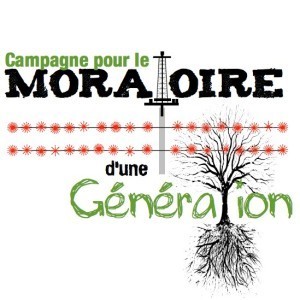
One Generation Moratorium sought to ban hydraulic fracturing for natural gas in Quebec for a generation’s time.
It is, he explains, about reclaiming our connections to each other, our sense of place and community, and using the threat of fracking as an opportunity to discuss what is important to us. We shouldn’t need a mega-corporation poised to poison our watershed to evoke such conversations, but it seems that the threat of fracking acts as a wake up call, similar to when a life-threatening illness forces us to confront our own mortality. It spurs those conversations that begin with I love you and what is really important? The worry of watersheds makes communities sit down and discuss how their resources of water, land, health, people, time, and money should be balanced. The concern about the toxins left behind in the wake of fracking compels citizens to think about their children of their great-grandchildren.
In the case of Quebec, resisting fracking is not an onerous distraction from life as usual . . . it is the story of our times. Philippe and the Quebecois bring creativity, humor, and community to the forefront of their campaign because hockey season must go on hold when industry invades one’s region. Life, however, waits for no one . . . and love and laughter cannot be abandoned in the struggle to protect watersheds.
When we realize how fleeting our opportunity for life is, joy and love become more precious than gold. A brush with death deepens our conviction to live, to make the changes in lifestyle, health, and diet that may prolong our time on this beautiful planet. All around the world, people face the destruction of extractive energy industries. On top of that, climate change is shifting the framework of mortality from our own individual deaths to that of our communities, our regions, and life-as-we-know-it. The Earth and all her ecosystems are struggling and we humans must grapple with the largest concept of mortality that we have ever faced.
The question is: will we grasp courage and love and strive for life with every fiber of our being?
Many already are. Up in Quebec, entire communities are leading the way.

Philippe Duhamel is a real life character straight out of Rivera Sun’s novel, The Dandelion Insurrection. Believe it or not, she really didn’t know him before she wrote the book .. though she’s delighted to know him now!
“Fighting destruction with destruction leaves the whole world destroyed. Resisting destruction with vitality is the most powerful force on Earth.” -The Dandelion Insurrection – a novel of love and revolution by Rivera Sun
Read more about the innovative – and successful – strategies of the Quebec anti-fracking campaign in Philippe Duhamel’s article in Open Democracy.
Also, tune in to Occupy Radio to listen to Philippe’s lively reflections on what’s working for the villages of Quebec. (This radio show airs on Nov 13th at 7pm PST/10pm EST here and will be available as a podcast on Nov 16th at OccupytheMedia.podomatic.com.)
For your reference and utter enjoyment, please check out The Singing Revolution, the story of Estonia’s nonviolent struggle for liberation. Watch the trailer: http://www.youtube.com/watch?v=DA9PmZo-2jo
Author/Actress Rivera Sun sings the anthem of our times and rallies us to meet adversity with gusto. In addition to her most recent novel, The Dandelion Insurrection, she is the author of nine plays, a book of poetry, and her debut novel, Steam Drills, Treadmills, and Shooting Stars, which celebrates everyday heroes who meet the challenges of climate change with compassion, spirit, and strength.
November 4, 2013
Envisioning Revolution with George Lakey
“The Quakers read the Bible like Jesus intended, shared it with Tolstoy, who inspired Gandhi, who set the state for Dr. King. We’ve got a tradition and we all gotta learn it, study it, and walk in it all our days.” – The Dandelion Insurrection by Rivera Sun
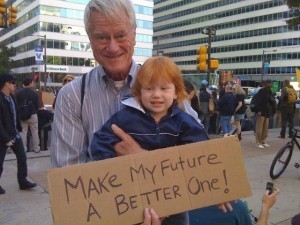
George Lakey with granddaughter at OccupyPhilly. Photo by Ingrid Lakey
George was interviewed by Rivera Sun and David Geitgey Sierralupe on Occupy Radio. To listen to the broadcast tune in on Wednesday Nov 6th at 7pm PST/10pm EST http://kwva.uoregon.edu/listen-live/
George Lakey was first arrested in the Civil Rights Movement and most recently arrested two weeks ago at a Earth Quaker Action Team demonstration to end mountaintop removal. The irrepressible twinkle in his voice suggests that between those two bookends lies a thick volume of adventures that span his seventy-five vibrant years on this planet.
In the lineage of nonviolent struggle, this man is a living torchbearer. A co-founder of the Movement for a New Society, crafter of the Five Stages of a Living Revolution, author of several books, and a fifteen year veteran director of Training For Change, George claims he is now retired . . . but he certainly hasn’t sat back from stirring up what some call beautiful trouble. It was his article in Waging Nonviolence on the Occupy Movement that caught my eye.
Like many others, I was caught up in the “pre-Occupied” bubble of my busy life until the movement swept into my small town and ripped my lazy compassion off the couch. Suddenly on the street, grappling with the consensus process, and floundering over my head in activism, Occupy’s crash course in engaged awareness cracked a few truths through my skull.
1. I am not apathetic, I deeply care about our world.
2. The problems are huge and real.
3. There are ways to address them.
4. I don’t know what they are.
Thus began a quest for knowledge that sent me to the Albert Einstein Institution and the work of Gene Sharp, Thich Nhat Hahn’s essays on engaged Buddhism, Joanna Macy’s work on The Great Turning, the writings of Gandhi, the speeches of Dr. King, and currently has me exploring the websites of Popular Resistance, Training for Change, Waging Nonviolence, and the Metta Center. Gems of wisdom are found each day. Friendships emerge. Discussions on practical revolution abound. Living treasures, like George Lakey, are approachable, affable, and often very willing to share their experienced wisdom . . . which is how I came to be interviewing him for the Occupy Radio show that I cohost.
In a Strategy For A Living Revolution, George created a framework to understand social change as a living, emergent phenomenon. Like an ecosystem, a tree, a Living Revolution ebbs and flows, grows, collapses, gains momentum and pushes forward until the flower of a new society blossoms. The Occupy Movement erupted from the mounting pressures of injustice like a crocus in the spring, trying to blossom in the harsh, icy reality of police repression. Occupations are powerful forms of nonviolent action, but they are vulnerable to arrests and police brutality. It is not the place to sit around discussing philosophy and long range plans. Fortunately, for both plants and the Occupy Movement, the Living Revolution says that movements may pass through the early phases of visioning, organizing, and confrontation many times before blossoming into the final stages of mass noncooperation followed by establishing the institutions of a new society.
George speaks and writes with an air of excitement as if revolution were not only possible . . . it is already fomenting in the fertile crumbling of our industrial growth society. His days with Training For Change sent him buzzing around the world “like a hummingbird,” he says, collecting the sweet nectar of solidarity and cross-pollinating movements with ideas and training. When asked what he thinks in needed in the United States, his reply is immediate.
“Vision.”
Then he laughs and qualifies the statement: cohesive vision. Vision is the soil form which movements collect their nourishment. Without good soil, plants – and movements – cannot endure. From George’s perspective, we are fortunate. We have many visionary people in this country. Everybody has ideas of what a better world might look like and many are already working to manifest those ideas. It is the big picture – the grand vision – that needs to be pulled from our hearts and articulated.
When I ask George if we could use multi-nodal, local groups to generate concepts of such a vision, then cross-pollinate the drafts by sharing them with other groups via the Internet, George lights up with enthusiasm.
“Yes! Exactly!”
So, my friends, perhaps it is time to Occupy again. But this time, let’s occupy square one, the foundation of revolutions, the ground from which change grows: Let’s gather in groups and Occupy Vision.
Forget tents in icy parks, let’s bake some cookies, pull up by a warm fire this winter, and hold Occupy Visioning Sessions. The lineage that precedes us has left us a tremendous toolbox for such processes. I recommend Popular Resistance’s Strategize Page as a resource, although there are many, many more. The following websites have compiled their visions for the future and can be used as inspiration for your own ideas. Of course, the real beauty of this process emerges in interconnection with others, so reach out, connect, and share your thoughts. This is not an original concept . . . it is how all revolutions begin.
Author/Actress Rivera Sun sings the anthem of our times and rallies us to meet adversity with gusto. In addition to her most recent novel, The Dandelion Insurrection, she is the author of nine plays, a book of poetry, and her debut novel, Steam Drills, Treadmills, and Shooting Stars, which celebrates everyday heroes who meet the challenges of climate change with compassion, spirit, and strength. Her novels and other writings can be found at http://www.risingsundancetheater.com/wpblog/
George Lakey was interviewed by Rivera Sun and David Geitgey Sierralupe on Occupy Radio. To listen to the broadcast tune in on Wednesday Nov 6th at 7pm PST/10pm EST http://kwva.uoregon.edu/listen-live/ or catch the podcast version on Sat Nov 9th at http://occupythemedia.podomatic.com
Websites offering visions:
The Metta Center http://mettacenter.org/roadmap/roadmap-description/
Popular Resistance http://www.popularresistance.org/category/create/
Websites offering tools for strategy and resistance:
Waging Nonviolence: http://wagingnonviolence.org
Popular Resistance http://www.popularresistance.org
Metta Center http://mettacenter.org
Albert Einstein Institution (the work of Gene Sharp) http://www.aeinstein.org
Training for Change http://www.trainingforchange.org
Articles cited in this article:
The Earth Quaker Action Team http://greenpnc.org
Strategy for A Living Revolution
http://www.historyisaweapon.com/defcon1/lakeylivrev.html
http://www.trainingforchange.org/manifesto_for_nv_revolution
http://wagingnonviolence.org/feature/revolution-comes-stages-occupy-otherwise/
Thich Nhat Hahn’s essays on engaged Buddhism http://viewonbuddhism.org/resources/14_precepts.html
Joanna Macy’s work on The Great Turning
http://joannamacy.net
November 1, 2013
Being Love in Action by Brian Heater

Brian Heater, author and counselor
(Rivera’s Note: Brian Heater offers his reflections on love-in-action – a tantalizing phrase for those of us who stand with one foot in heart-based circles and the other foot in social/political action. Ever since hearing the phrase in filmmaker Velcrow Ripper’s documentary, Occupy Love, the words have echoed like a mantra . . . and a challenge. Thank you Brian for tackling the complexity of these words!)
I have had a new awakening of sorts recently about love. I was encouraged by my recent discussions with friends that, in this time of great change, we indeed need to put our love into greater action. Why may you ask? First of all, I believe love is the greatest force there is. Compassion and loving kindness transforms others. Love creates miracles. In this age of a broken system and unsustainable way of life we need to reevaluate what love actually means for you and I. Is it just the way we treat others? Is it a way of life? Or is it more than that? What does it mean when we become love in action?
As a writer and counselor I have focused a lot of my time helping people with self healing and well-being work. This of course is an essential part of change. The inner work that we do makes ourselves more loving and patient; less stressed and healthier…these are all important in our transformation. I still believe that personal inner work is one key to positive world change. Self actualization is essential and it has helped evolve our society in many positive ways. Through this process many of us have come to understand that we are all connected. This is a key. Over time I have also realized that that there is something that needs to be emphasized in this equation. This is the role of community and conscious action. My work has since expanded to include conscious living – the aspect of becoming aware of our actions and how they affect our larger circle and society. This work in itself has led me to the belief that positive direct action based on love is essential….love in action defines the way we function and live. It is the survival tool for the 21st century and beyond.
What is action? It is defined as “the state or process of acting or doing”. That is, what we are doing in our lives is an “action”. This could include our words, our deeds, how we treat others, what we purchase, how we spend our time, what we speak out for, what we eat, etc., etc. To a certain extent we are in a state of action most of the time. This leads me to an important conclusion: that direct action is a crucial part of a larger cultural change. Without action in our world there is no movement and no change. Without action there is no evolution or transformation. All of what we do in the world is made up of many small acts on a minute by minute basis. We do make a difference when we act with love. Isn’t this a powerful idea?
Our personal action of love is the first step. It reverberates out to others. Indeed we are all made up of energy. Science and spirituality are slowly merging. What we think and feel does matter. What we project in our hearts and minds does alter the larger energy field. It is important to be aware of this. Each thought we take is an action. The movement of energy itself is an action. When combined with a loving intent and compassionate focus you and our world transforms…step by step, from the old competitive paradigm that no longer works to the new cooperative one that does.
Taking that personal action of love a step further and becoming love in action on the larger level is also essential for our world. We can do important work as individuals, but we need to expand this to the larger group and society. We have to connect with others. We need to give our energy to help others. We have many social, economic and environmental issues that need to be recognized and acted upon with love. We cannot just sit back and watch. We cannot be idle. We are called to action. We all have our skills and talents. Find that thing that you love. Use that skill that you have and be “love in action”. Each step we take, each experience, each action of love we take is a powerful thing.
Everyone has their personal path of love in action. There are many paths one can take. The important thing is to take one. Find your internal compass and take small steps each day. When we take daily conscious steps of love in action we change ourselves, the world and those around us forever.
Brian M Heater is an author, new thought counselor and conscious living advocate. His most recent book 30 Steps to Conscious Living is available on Amazon.com. Stay tuned for his newest evolutionary novel The Mystic Paradigm to be published Spring 2014
For more information on his work, free articles and other information please visit http://www.transformingourselves.com.
October 27, 2013
“On Love” by Tangerine Bolen
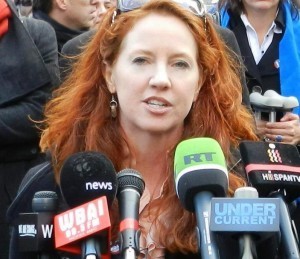
Tangerine Bolen, Executive Director of Revolution Truth
(Rivera’s Note: Tangerine Bolen, whom I am honored to call a friend, has shared a dose of deep wisdom gained from her personal experience. A deep thinker, a torch bearer, an incredible woman, Tangerine is a soul worth savoring, in word and in person. Consider yourself fortunate for a chance at either. Enjoy these courageous words on love … and leave your thoughts in the comments section below. Thank you!)
“On Love” -a guest post from Tangerine Bolen, Executive Director at Revolution Truth
It seems a lot of people are going through some measure of tumult or loss right now. Or perhaps, because I am fighting for my life, I have entered the strata where suffering is ever present, that darker river of life that runs through us all, that seeds a part of our existence here.
And because of what I see, I want to tell you that you are loved. I may not know you, but I do think about you. I picture you being held up, being in the light. I picture love and hope and faith coming to you, surrounding you, filling you up. In my worst moments, the moments I am having when death would truly be a mercy (and they are increasingly frequent) I picture every single person who is suffering being lifted up, being held by the light that runs through all of us. That light may be one that our world turns its back on, pretends doesn’t exist. But that’s not true, and we know better, no matter how afraid we are. Of course the light exists! It is here for all of us. We are made of it. We come from it. We return to it.
While pain is changing my body, my place in the world, and affecting my life force, I picture every single person who needs it finding a deeper measure of hope in the midst of humanity’s madness. I picture armor being formed – armor, made out of fierceness and love – love for all of us, for ALL life on this planet, love for our tumultuous, wild existence here, love for the possibilities ahead, no matter how dark the road we seem to be on. I picture everyone being able to be whole, to be realized. I picture coming out of these dark days of broken systems and pathological “leaders” and planning, spinning, weaving together a brighter future, a future made out of the incredible imaginations of our dreamers and our clearest pragmatists combined. I can see our systems and societies remade and fueled by what is best in us, in smart, loving, and ingenious ways.
Hold on tight to the deepest part of your heart. Do not lose your vision. Get reacquainted with lost feelings, a lost knowing that transcends every circumstance. Let go of any and all bitterness. Do not be afraid to let the wrong armor dissolve – just consider letting it dissolve quietly, lovingly, so that you do not startle the ones around you who are terrified of living without the dark armor our world insists is the only way to live – the armor that makes us petty, afraid, competitive, small. Make your armor out of the best of yourself, no matter where you’re at, no matter your circumstances, no matter that you don’t know how you will get by, or how change will be safe when your entire environment says “protect the status quo”. Know that there will be loss in being brave – and there will be incredible gain – gain you cannot put into words, gain that will change you and change your life for good.
Stand up, inside of you, while you are quiet and alone. Recognize those who are standing up around you. Acknowledge them. Light your own candle. Lean in. And always light the candles of those who need a little help remembering who they are along the way. Light begets light, love begets love, true power is never competitive.
Trust something deeper. Know that you are loved, and that you are never alone. This river of tumult, the way our society and world is turning ever away from truth and decency – no matter its juggernaut character, it is still only the smallest part of us, of our scared imaginations. And it is possible to transcend all of it. No matter what.
October 21, 2013
A Soft-Spoken Opponent of Oppression
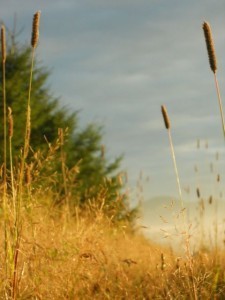
Jamila Raqib, the Executive Director of The Albert Einstein Institution, which advances the study of strategic nonviolence (including the works of Gene Sharp), was interviewed by Rivera Sun and David Geitgey Sierralupe on Occupy Radio. To listen to the broadcast tune in on Wednesday Oct 23rd at 7pm PST/10pm EST http://kwva.uoregon.edu/listen-live/
(One of the Real-Life Dandelion Insurrection Stories)
by Rivera Sun
Soft-spoken and humble is the new heroic.
This realization hits me as I interview Jamila Raqib, the Executive Director of the Albert Einstein Institution. I find myself in awe of her living wisdom as my Occupy Radio co-host and I question her about the strategies of nonviolent struggle, the seminal writings of Gene Sharp, and how this knowledge has been used to end tyranny and oppression. In spite of the enormity of the subject and the depth of her answers, Jamila responds with unwavering humility. She possesses that special wisdom of knowing how little one actually knows in comparison to the complexity of the world. Speaking with her, I am humbled to the core.
My frequent readers will laugh, since this fiery, redheaded writer regards humility as that green leafy vegetable they keep saying is good for me . . . especially since my standard diet is the bread of confidence dipped in the oil of bravado and sprinkled with a certain spice of audacity called chuztpah. (A Jewish boyfriend once called me “a recipe for mishegas” – craziness – and while it’s true, it is also a story for another time.) Suffice to say, humility is a virtue I admire in others and strive for haphazardly in myself.
But this soft-spoken woman utterly and completely humbles me as she explains how people around the planet have used the strategies of nonviolent struggle to topple dictators, resist tyranny, end oppression, prevent military coups, bring enduring democracy to populaces, and create freer, more open societies. As an actress, I strut and parade on stages all the time, but the “theater” of this woman is the globe. The actors are vast populations. The show does not end when the fat lady sings, it goes on and on throughout history, and, when the heroes die, they do not rise to bow in the limelight. Jamila Raqib speaks modestly because her words affect the lives of millions, the stakes are high, and, in truth, a huge company is required to ensure the success of these epics. She describes her role honestly as someone who advances the study of nonviolent struggle and lets the credit fall where it is due . . . on the courageous people who use it.
Do you see why I am humbled?
I dove into the study of nonviolent struggle, particularly the work of Gene Sharp, when I began writing my latest novel, The Dandelion Insurrection. Set in a time that looms around the corner of today, in a place on the edge of our nation, the novel follows – and fictionalizes – the disturbing trends in the United States of corporate control of politics, the rising police state and government surveillance, the restrictions on civil liberties, and increasing authoritarianism. As a writer, I try not to give my characters problems they can’t solve, but by the time one character stated that a closet corporate dictatorship was ruling in the guise of democracy, I thought, forget the characters, how are we, in real life, going to get out of this mess?!
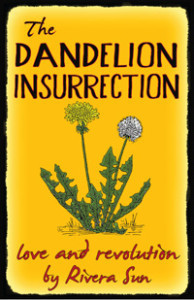
Rivera Sun’s epic novel of nonviolent struggle, love, and revolution!
This is where Jamila Raqib, Gene Sharp, and the Albert Einstein Institution come in, quietly and humbly, as if saying, well, Rivera, you (and America) are fortunate. You’re not the first to be in this predicament. Populations around the world have been courageous enough to resist oppressive regimes and there are extensive studies on this . . . including some succinct downloadable manuals.
Hallelujah! I knew there were more sensible ways of going about restoring democracy that my crazy notions. Wiser heads than mine have studied history and current events, derived theories and conclusions, articulated them, and conveniently compiled them into books and manuals for me to study and fictionalize into a novel.
Now it is my turn to laugh and shake my head ruefully. While the Dandelion Insurrection reflects some aspects of this study, as an author I must admit that it comes far short of a portrayal of a well-studied strategic plan of action. It does, however, excel in other ways. The Dandelion Insurrection wonderfully depicts the all-too-common reality of actual movements: great ideas, not quite enough planning, some luck, some miracles, and some hasty emergency actions. If we all read our Gene Sharp and heeded his warnings on the importance of adequate preparation and analysis before engaging in struggle (or fictionalizing such things) a good deal of mishaps, catastrophes, and turmoil could be avoided. In real life, a lack of planning is leads to disaster. In the fictional world, it merely creates drama. For the purpose of the safety of human lives, it is important not to confuse the two.
At one point, I was tempted to place a disclaimer at the front of the novel: This is a work of fiction. No tactics or strategies should be used without consulting a doctor of nonviolent struggle. But the interview with Jamila reminded me that while humility is grounded in a realistic admission of the limits of one’s knowledge, it should never be used as an anemic cop-out to social responsibility. As I listened to Jamila – a woman who is as wise, human, and imperfect as the rest of us – offer the radio listeners a taste of her vast body of information, point to its limits, and still place her wisdom in service of this world, my respect for her grew by the minute.
She also inspired me to not halt at the frontier of my own understanding, but to go beyond it. My earlier research for The Dandelion Insurrection was enthusiastic, but haphazard. I have since learned that there is a succinct manual co-written by Jamila and Gene Sharp, Self-Liberation: a guide to strategic planning for action to end a dictatorship or oppression, that provides a basic overview and lays out a course of study for those who wish to engage in or learn more about nonviolent struggle. During our interview, Jamila mentioned that some people are dismayed to discover this course of study begins with eight hundred pages of recommended reading . . . and then advises even more.
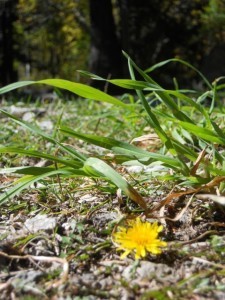
Join us for a discussion of this radio interview on Facebook on Wednesday Oct 23rd 7pm PST/10pmEST (Click this image for the link)
Well, perhaps it is another character flaw of mine, but when I’m told something is difficult, I naturally dive into it. This may get me into trouble someday but, in this instance, it merely challenged me to work my way through the eight hundred pages systematically. I am not a scholar by nature, but discipline is -apparently – another one of those green leafy vegetables that are good for me. If I read twenty-five pages a night, I should complete these readings in about a month. This is hardly a rigorous course of training . . . and the whole day of reflection and thought between readings has led to some interesting insights.
One thing I have learned is that these theories are most effective when the basic principles are broadly understood. That means you, my friend, are invited to peruse at least one of the short manuals that can be downloaded from the Albert Einstein Institution (here) and to listen to the radio interview with Jamila Raqib (here) and to join the conversation in the Dandelion Insurrection group on Facebook (here). As your fellow student, I welcome your thoughts and dialogue. In this time of societal turmoil, it seems important that we all gain a firm grasp on strategic nonviolent struggle. I can think of no other month-long commitment that has such profound ramifications for our communities, our nation, and our planet.
Yours in love and revolution,
Rivera Sun
Special thanks to David Geitgey Sierralupe, host of Occupy Radio/Occupy the Media Podcast, for the opportunity to cohost. David hosts a regular weekly talk show with an incredible line-up of interesting speakers that I encourage you all to check out. (here) The show is also broadcasted on Wed nights at 7pm (here).
The Dandelion Insurrection will be released on Nov 8th, 2013. It is available for pre-ordering (here). Please join us for the release party on Nov 8th via a live stream broadcast of a reading & performance by author/actress Rivera Sun (here). If you are local to Taos, NM, come on down to Moby Dickens Bookshop and join us in person for dandelion wine, hors d’oeuvres, autographed First Editions, and more!
From the Desk of Rivera Sun
- Rivera Sun's profile
- 161 followers


